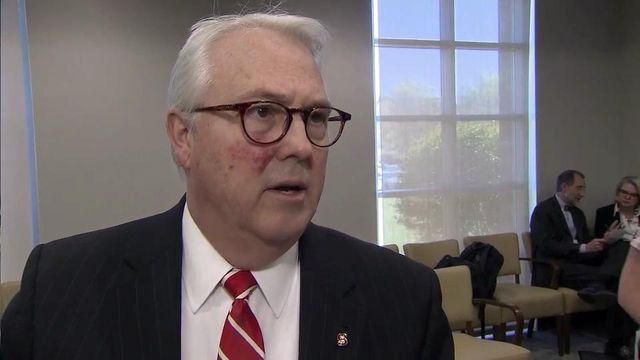Woodson: NCSU losing business because of HB2
North Carolina State University has lost out on some potential business relocations to its Centennial Campus because of a new law that sets discrimination policy statewide, Chancellor Randy Woodson said Thursday.
Posted — Updated"We've had, in the last week, a number of companies we were talking to about coming onto our campus indicate that they are no longer interested," Woodson said in Chapel Hill, where he was attending a University of North Carolina Board of Governors meeting.
He blamed the change of heart on the Public Facilities Privacy & Security Act, commonly referred to as House Bill 2, which was signed into law last month after a special one-day legislative session. The law requires people to use public bathrooms that correspond to their birth gender, excludes gays, lesbians and transgender people from protections against employment or public accommodations discrimination and bars cities and counties from extending such protections.
Dozens of companies lease space on Centennial Campus, and N.C. State forges close research relationships with many of them, and Woodson said the impact of House Bill 2 has gone beyond scaring off business.
"This is having an impact on our ability to recruit faculty. There are a lot of questions about it," he said.
The Board of Governors discussed the growing fallout from the law before its slate of committee meetings on Thursday.
"There’s been an awful lot said about it. My position is this: The primary mission of UNC is to educate students in North Carolina. Give them a high-quality, low-cost education," Chairman Louis Bissette said. "We don’t discriminate against anybody. Our students come in all shapes, sizes, colors, religions, sexual orientations. We don’t discriminate."
UNC President Margaret Spellings said last week that she feared the "chill" the law could have on the 17-campus system and planned to talk with lawmakers about ways to soften the impact. She also has spoken with U.S. Department of Education officials about the law and the possible loss of federal financial aid support and research grants because of any violations of federal anti-discrimination laws.
Spellings said Thursday that discussions are continuing on both fronts.
"We’re staying in touch with our institutions about the various implications and effects of the law and gathering that information to present to the board and legislature," she said. "We continue to think through ideas, what might provide relief."
She called Gov. Pat McCrory's executive order this week, which asks lawmakers to repeal the section of the law that takes away workers' rights to sue employers for discrimination in state court, a step in the right direction.
"He's hearing what we're hearing with respect to the chill that it's having on our institutions," she said.
Last week, Spellings told chancellors that no campus will be required to change its discrimination policies because of the state law, although campuses will have to follow the directive on designating multiple-occupancy bathrooms for specific genders.
The Board of Governors was supposed to hold its monthly meeting at UNC-Asheville, but the potential for large student protests there forced officials to move it to Chapel Hill. Protesters were expected to demonstrate against House Bill 2 and against Spellings, who has been a target for criticism since the board chose her as president last fall.
"We’re here today instead of being in Asheville partially as an impact of HB2," said Bissette, an Asheville lawyer. "We’ve been impacted. I’m not going to get into the pros or cons of it. We’re a state entity, we’re trying to educate students and that’s what we’re going to continue to to."
• Credits
Copyright 2024 by Capitol Broadcasting Company. All rights reserved. This material may not be published, broadcast, rewritten or redistributed.






